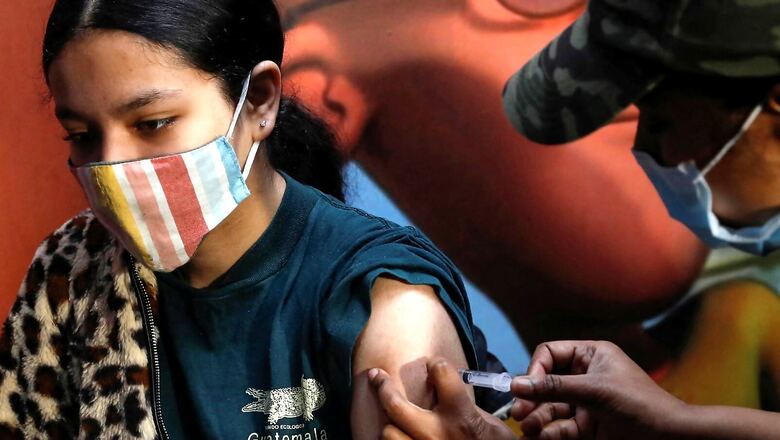
views
India is now in the middle of a third wave of COVID-19 infection. The devastation caused by the last wave is still fresh in our minds, when a surge in cases was associated with lack of oxygen, beds and medicines. Many of us lost our loved ones during that time last year. Hence, when dealing with the third wave, it is normal to feel scared.
The current wave of COVID infection is riding on the back of a new variant named Omicron, which was first discovered in South Africa a few months ago. The variant caused rapid waves in South Africa before moving to Europe and America where it is currently breaking records in terms of case tally. We started reporting Omicron cases around year-end and since then the hike has been steep.
In the last 10 days, the number of daily COVID-19 cases have increased 10-fold. The wave triggered by this variant is likely to surpass the peaks achieved by other variants. Omicron escapes immunity by vaccine or previous infection in a lot of cases. The good news though is that the disease causes lung damage in a lesser proportion of people, in other words, fewer people will need oxygen support. Although the recovery seems to be quick, we should not let our guard down. Remember we have already been to the hell and back. For now, it is time to revisit the basics. Here are seven points to help you deal with the Omicron crisis:
1. A lot of patients with Omicron infection are showing little or no symptoms. In patients with symptoms, these are fever, cough, cold, sore throat and headache. In some, symptoms do become severe and India has now reported two deaths linked to the Omicron variant. It is easy to ignore these symptoms and not opt for testing. But remember, testing is the starting point for controlling this infection from spreading to others, thus avoiding an outbreak. Also, if detected early, one can be monitored for danger signs. So, do get tested at the earliest. One can also use home testing kits.
2. While Omicron is known to escape immunity provided by vaccination, there is compelling evidence that double doses with a booster shot provide more protection than just two vaccine doses, which in turn is better than a single shot, and which is better than being unvaccinated. So get your vaccine and await your turn for booster shot and get it when eligible. Also, vaccination for children aged 15-17 years has started and they should be encouraged to take the vaccine. A reminder that COVID vaccination is safe for pregnant and lactating mothers, elderly and those with comorbidities like high blood pressure or diabetes.
3. Till almost everyone in the world is sufficiently covered with vaccination, we will see variants of the coronavirus emerging and some spreading very fast. Vaccination is just one of the weapons in our arsenal, the other important weapon being masks which can keep the infection at bay. So, mask up—go for one with a snug fit that covers your nose and mouth. Double masking with a surgical mask under and a cloth mask is recommended for general public. If using only fabric masks, it should be two-layered or more. Avoid the urge to repeatedly touch your mask, adjust it with ear loops if required. Besides, meticulously/religiously follow hand hygiene and social/physical distancing. Importantly, understand that COVID is airborne so avoid closed, ill-ventilated spaces.
4. Avoid all non-essential travel. While most states are imposing restrictions like curfews or curtailment of public transport, people on essential duty cannot help but use the public transport. If you are not one of them, please don’t venture out. Stay at home as much as possible. When using transport, remember riding a bicycle alone is better than travelling in a car with too many people.
5. Don’t clamour for lockdown. There is now evidence and experience from the last two waves that show that full-scale lockdowns are not an effective way to stop COVID transmission. These lockdowns, however, severely affect the unorganised sector and small businesses. Not everyone can work from home. If you can, please use the facility.
6. Take care of your mental health during this unending crisis. Most of us are experiencing COVID fatigue with repeated lockdowns, closure of schools, colleges and offices, losing loved ones, and the daily unfolding of crisis. This is the time to hold on to our inner resilience. Stay connected with friends and family. Avoid self/over medication. Eat well and have adequate sleep. Self assess and if needed, seek mental health support by calling on a helpline number or booking an online consultation with an expert. Also, support each other during these difficult times. Talk to friends and family more often, keep a tab on their health, meet and celebrate virtually. Human Solidarity Foundation’s helpline number for mental health support is 9818540802.
7. Share correct health information. There is a misinfodemic that is spreading through social media. Stay informed but step away from the media for a little while if you feel overwhelmed. We are often bombarded with myths about COVID through WhatsApp forwards. Share information, not misinformation. Also, if someone needs help, connect them to a doctor, there are free medical helplines available, like Human Solidarity Foundation’s free medical helpline (9971736222).
Dr Aqsa Shaikh is Associate Professor of Community Medicine and Nodal Officer, Covid Vaccination Centre at Hamdard Institute of Medical Sciences and Research, New Delhi. Dr Sana Hussain is Assistant Professor of Anesthesiology, Critical Care and Pain Medicine at HIMSR. The views expressed in this article are those of the authors and do not represent the stand of this publication.
Read all the Latest Opinions here




















Comments
0 comment